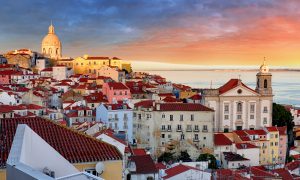===INTRO:
The humble sardine, a small silvery fish that navigates the vast Atlantic, holds a place of reverence in Portuguese society, so much so that it transcends the mere confines of cuisine to embody a significant cultural emblem. This article delves into the rich tapestry of history and culture surrounding sardines in Portugal, exploring how this tiny fish has maintained its integral role through centuries.
Unveiling Portugal’s Age-Old Sardine Legacy
The history of sardines in Portugal is as deep and expansive as the oceanic waters these fish inhabit. For centuries, the Portuguese have been harnessing the bountiful harvest that the Atlantic Ocean offers, with sardines being a staple catch. The practice of sardine fishing is steeped in tradition, dating back to when coastal communities would watch the skies and sea to signal the right times for fishing, guided by generations of accumulated knowledge. The annual sardine run, when these fish are most plentiful and fat, marks a period of festivity and prosperity in many Portuguese towns.
The preservation methods of sardines are a testament to the ingenuity of the Portuguese people. Historically, salting and drying were common to extend the shelf-life of the catch. However, the advent of canning in the 19th century revolutionized this process, making sardines a major export product of Portugal. Canned sardines, often packed in olive oil, became a global commodity, linking Portugal’s economic fortunes to this silvery fish. The vintage labels of these cans are now considered a nostalgic art form, capturing the essence of a bygone era.
Festivals celebrating sardines epitomize the fish’s importance in the cultural fabric of Portugal. Every summer, particularly during the festival of St. Anthony in June, streets come alive with the scent of grilled sardines. This festive tradition not only attracts locals but also tourists, who flock to taste this simple yet delicious fare. These festivals, replete with music, dancing, and communal dining, underscore the sardine’s role in fostering community spirit and national pride.
Sardines: Integral to Portuguese Culture and Cuisine
In Portuguese cuisine, sardines are more than just food; they are a culinary icon. The traditional method of grilling sardines over charcoal captures their rich, oily flavor, turning them into a delicacy served hot on a slice of fresh bread, often accompanied by a dash of lemon juice and a side of salad. This dish, known as "sardinhas assadas," is not only a summer staple but also a culinary ritual that brings families and friends together around the dinner table.
Beyond the grill, sardines are versatile in the Portuguese kitchen. They are used in a plethora of dishes, from "caldeirada," a rich fisherman’s stew, to "pataniscas de sardinha," where they are mixed into a flavorful batter and fried. The integration of sardines into various recipes demonstrates their adaptability and the creativity of Portuguese cooks who have perfected these dishes over generations. Moreover, the nutritional value of sardines, rich in omega-3 fatty acids and protein, makes them a favored choice among health-conscious individuals.
The socio-economic impact of sardines on Portugal cannot be overstated. The fishing industry, centered around sardines, has historically been a lifeline for many coastal communities, providing employment and sustaining local economies. The canning factories, many of which are century-old establishments, are not just workplaces but cultural heritage sites that narrate the story of Portugal’s rise in the global fish market. The annual fish catch still dictates the economic rhythm of these regions, showcasing the enduring relationship between the Portuguese people and the sardine.
From the festive streets of Lisbon during St. Anthony’s feast to the quiet dinner tables across the country, sardines are a pervasive element of Portuguese life. Their influence stretches beyond the culinary, weaving into the social, economic, and historical threads of Portugal. As this article has shown, the sardine is not merely a fish; it is a cultural artifact, a symbol of resilience and unity that continues to shape Portugal’s destiny on the world stage. In appreciating the sardine, one grasps a deeper understanding of Portuguese identity and heritage.

Gonzalo
Founder/Owner of The Lisbon Guide, one of the major blog references in Portugal, established in 2014 and receiving every year 250.000 visitors from all over the world, looking to provide the best experiences in Portugal. In partnership with Portugal Magik for all private tours and transfers across Portugal, Gonzalo loves a good seafood meal at Monte Mar Cascais, and all from Michelin Chef Avillez. Favorite Hotel in Lisbon/Portugal, Penha Longa Resort by Ritz Carlton.
For over 15 years, Gonzalo have been helping thousands of travelers yearly to plan a perfect trip to Portugal. Based in Lisbon/Cascais and working in this field for over 20 years, with multiple ongoing projects. Also an avid TripAdvisor user level 6 with more than 300.000 readers worldwide.
Many years working also as a Private Guide of Lisbon, Sintra, Fatima, Porto, Douro Valley, Evora, and other locations in Portugal.


















































